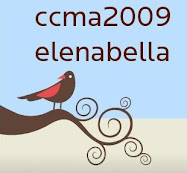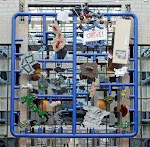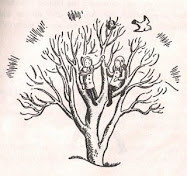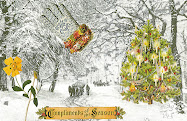
MINT
It looked like a clump of small dusty nettles
Growing wild at the gable of the house
Beyond where we dumped our refuse and old bottles:
Unverdant ever, almost beneath notice.
But, to be fair, it also spelled promise
And newness in the back yard of our life
As if something callow yet tenacious
Sauntered in green alleys and grew rife.
The snip of scissor blades, the light of Sunday
Mornings when the mint was cut and loved:
My last things will be first things slipping from me.
Yet let all things go free that have survived.
Let the smells of mint go heady and defenceless
Like inmates liberated in that yard.
Like the disregarded ones we turned against
Because we'd failed them by our disregard.
-- Seamus Heaney
Note how "defenceless" is spelled the British way, more easily suggesting a "fence" pun around the trope of liberation and letting go. This poem linked back to Heaney's first ("Digging") and to the topic of memory:
My last things will be first things slipping from me.
Yet let all things go free that have survived.
Heaney's mother made sauce from the mint; he made a kind of music:
The given line, the phrase or cadence which haunts the ear and the eager parts of the mind, this is the tuning fork to which the whole music of the poem is orchestrated, that out of which the overall melodies are worked for or calculated. [from Heaney's essay "The Makings of a Music: Reflections on Wordsworth and Yeats" in Preoccupations.]
Look how that poem moves from the small green beloved-yet-underestimated sauntering thing (every time the word "saunter" appears in Irish literature we have a vivid echo of Joyce, who "owns" that word) – like a mint plant sending out tenacious underground runners. It concludes with another "last thing": the disregarded/discarded "ones we turned against/ because we'd failed them by our disregard."
We turn against "the disregarded ones" and not the other way around, because of our failure to regard, to notice. It's a poem that ponders the enduring appeal of those "almost beyond notice" things (or "ones") we often neglect, that might nonetheless be ripe/rife for transformation .
A few fresh minted snippets of memory, reshaped and arranged – for the eager parts of the mind.







































































































































.jpg)









































































































































.jpg)









































































































No comments:
Post a Comment